![]()
Zaterdag, 25 December, 2010 | The Guardian: Document 1, Document 2, Document 3 | Bewerkt door Crethi Plethi
WikiLeaks: Syrië Verdacht Israël van Moordaanslag
De Syrische autoriteiten verdachten Israël van de moordaanslag op Mohammed Suleiman, de top veiligheidsadviseur van de Syrische president Bashar al-Assad.
Het was laat in de avond op 1 augustus 2008 in de Syrische kuststad Tartus toen een scherpschutter het fatale schot afvuurde. Het doel was de Syrische generaal Mohammed Suleiman. Volgens de Amerikaanse ambassade in Damascus waren de Israëli’s “de meest voor de hand liggende verdachten” voor deze aanslag.
De op WikiLeaks gepubliceerde documenten van het Amerikaanse ministerie van buitenlandse zaken laten de paniek zien die ontstond bij de Syrische autoriteiten. “De Syrische veiligheidsdiensten hadden het hele gebied afgezet waar de schietpartij had plaatsgevonden en doorzochten het strand en het gebied erom heen,” was de ambassade verteld. Journalisten in Syrië werden geïnstrueerd om niet over de aanslag te berichten. Het was opnieuw een sensationele aanslag op een hooggeplaatste Syrische functionaris, vergelijkbaar met een andere mysterieuze aanslag in Damascus eerder dat jaar toen een autobom Imad Mughniyeh, de mede-oprichter en militaire leider van Hezbollah, had gedood.
Tijdens de eerste vier dagen na de aanslag waren er slechts vage meldingen over de identiteit en de positie van het slachtoffer. Maar de Amerikaanse regering wist precies om wie het ging. Een geheim Amerikaans document gaf enkele maanden eerder een precieze taakomschrijving van Suleiman: “De Syrische presidentiële speciale adviseur voor wapenaankopen en strategische wapens.”
Elf maanden eerder was een geheime nucleaire site in Al-Kibar, een woestijnachtig berggebied in Syrië, dicht bij de Eufraat rivier door vermoedelijk Israëlische gevechtstoestellen aangevallen en verwoest. Dit was waarschijnlijk één van de speciale projecten die Suleiman beheerd “moet hebben, en die onbekend waren bij de Syrische militaire leiding in het algemeen.” Volgens Israëlische media had Suleiman ook gefunctioneerd als contactpersoon tussen de anti-Israëlische sjiitische Hezbollah militie en president Assad van Syrië.
De Syrische marine heeft een gebrekkig onderhouden marinebasis in Tartus, de op één na grootste havenstad van Syrië en diende tevens als bevoorrading- en onderhoudsbasis voor de Russische marine. In augustus 2010 kwam het bericht naar buiten dat de Russen de basis gaan moderniseren zodat na 2012 grote oorlogsschepen kunnen aanmeren. De basis stamt nog uit de Sovjet-periode (1971), maar was sinds 1992 in verval geraakt.
Na de aanslag was voor de Amerikaanse functionarissen Israël de voor de hand liggende verdachte. “Syrische veiligheidsdiensten zijn zich terdege bewust dat de kustplaats Tartus een gemakkelijker toegang bieden voor Israëlische agenten dan de meer landinwaarts gelegen locaties zoals Damascus. Suleiman was niet een op de voorgrond tredende regeringsfunctionaris en het gebruik van een scherpschutter suggereert dat Suleiman van op afstand visueel te identificeren moet zijn geweest.”
De Syrische overheid hulde zich in stilzwijgen, wat volgens de Amerikaanse ambassade op drie dingen kon wijzen: (1) “Ze weten niet wie het gedaan heeft,” (2) “ze willen geen beschuldigingen uiten die de prille vredesbesprekingen met Israël beschadigen of stopzetten,” of (3) “het bekendmaken van deze gebeurtenis zou opnieuw een lek in het falende Syrische beveiligingssysteem openbaren.”
Rapporten over Syrische interne discussies in de nasleep van de Tartus aanslag suggereerden dat Syrische veiligheidsfunctionarissen gesterkt werden in hun opvatting dat vredesbesprekingen met Israël een slecht idee waren.
Tien dagen later werd door een bron van de Amerikaanse ambassade gemeld dat de aanslag in Tartus “een bron van controverse was geworden” tijdens interne beraadslagingen van de Syrische regering. “De gemoederen laaide hoog op tijdens een op 12 augustus gehouden raadsvergadering voor hogere beleidsniveaus, toen hoge functionarissen van de veiligheidsdiensten openlijk vraagtekens plaatsten bij het voortzetten van de indirecte onderhandelingen met Israël door de Syrische overheid en de Syrische ‘vrijgevigheid’ aan Libanon.” Leiders van de veiligheidsdiensten beweerden dat Syrië concessies zou doen en geen tastbare voordelen zou ontvangen voor tegemoetkoming aan Libanon of indirect overleg met Israël.
“Achter deze gespannen uitbarsting lag de frustratie van de veiligheidsdiensten over het negeren van de moord op Suleiman door de Syrische overheid. De functionarissen van de veiligheidsdiensten vroegen zich af dat ‘als de Israëli’s het deden’, waarom de Syrische regering dan door ging met de dialoog [met Israël],” vertelde de bron. “‘En als het een klus van binnenuit was, waren de mensen ongewis over hun eigen toekomst.”
President Assad kwam hiermee onder toenemende druk om garanties te bieden voor zijn veiligheidsfunctionarissen betreffende hun standpunten en om duidelijk te maken dat de overheid niet de intentie had om voortijdige concessies te doen.
De documenten laten ook zien dat de Verenigde Staten financiële sancties hadden willen opleggen aan Mohammed Suleiman als onderdeel van een poging om het regime van Assad te verzwakken, maar kwamen erachter dat dit lastig was omdat de informatie over Suleiman zo geheim was dat het niet openbaar gemaakt kon worden in het geval er sancties opgelegd werden. Volgens de Amerikanen zou het resultaat slechts beperkt zijn, aangezien zijn activiteiten niet erg bekend waren. Daarom was het lastig om niet-geheime informatie te vinden wat gebruikt kon worden voor een publieke verklaring als er sancties opgelegd werden en het zelfs onwaarschijnlijk was dat dit in Syrië zelf opschudding zou veroorzaken.”
Zoals we nu weten werd dit ‘probleem’ op een andere manier opgelost waarbij het aannemelijk is dat of de Israëlische dan wel de Amerikaanse geheime dienst achter de aanslag zat.
Bron: WikiLeaks
Sunday, 03 August 2008, 15:39
S E C R E T SECTION 01 OF 02 DAMASCUS 000541
NOFORN
SIPDIS
DEPT FOR NEA/ELA
NSC FOR ABRAMS/SINGH
EO 12958 DECL: 08/03/2028
TAGS PGOV, PTER, SY, LE, IS
SUBJECT: TOP ASAD SECURITY AIDE ASSASSINATED
Classified By: Pol/Econ Counselor Tim Pounds for reasons 1.4(b,d)——-
Summary
——-
1. (S/NF) Syrian Presidential security aide Brigadier General Muhammad Sulayman was assassinated by a sniper late on the evening of August 1 in the coastal city of Tartous. Sulayman enjoyed a reputation among Embassy contacts as having special status and proximity to Bashar. Sulayman was said to have managed special projects for Asad, some of which may have been unknown to the broader Syrian military leadership. Our expectation is that the SARG will try to keep this incident under wraps as long as possible, but that will become more difficult as regional and international press run with the story. End summary.
—————————-
Details Murky After Official News Blackout
—————————-
2. (S/NF) On August 3, the Israeli daily Ha’aretz cited “senior sources in Damascus” in reporting Sulayman’s assassination on its website, identifying Sulayman as Asad’s “liaison” to Hizballah. Al Hayat and the news ticker Al Bawaba also reported the story. A reliable Embassy press contact said that he had heard of the attack yesterday, and said that the version of the story he had heard was that Sulayman’s entire family had also been killed. According to the contact, Syrian security services quickly cordoned and searched the entire beach neighborhood where the shooting had occurred. Other Embassy sources would say little except that Syria-based reporters are under instructions not to report the story. As of late August 3, all Syrian-based press remains silent.
————————
Pointing the SARG Finger
————————
3. (S/NF) As in other recent assassinations in Syria, speculation about who could have done it will likely be rampant. The most obvious suspects are the Israelis. SARG security services are well aware that the coastal city of Tartous would offer easier access to Israeli operatives than would more inland locations such as Damascus. Sulayman was not a highly visible government official, and the use of a sniper suggests the assassin could visually identify Sulayman from a distance. As Tartous is also close to the northern-most part of the Syrian-Lebanese border, the SARG might blame pro-Saudi Islamist militants from Tripoli or the Nahr al-Barid camp. Some may even go so far as to suggest the (comment: unlikely) possibility that this was an inside job to prevent Sulayman from damaging the Syrian regime.
————
Implications
————
4. (S/NF) Although officially just a Brigadier General, Sulayman was considered President Asad’s top security aide and was known to manage several special projects for Bashar — some of which may have been unknown to the broader Syrian military leadership. Sulayman’s proximity to Asad granted him special status in the eyes of more senior Syrian military officials.
DAMASCUS 00000541 002 OF 002
5. (S/NF) If the SARG were to suspect an Israeli role in the assassination, it may be reluctant to level public accusations as (1) they may not know who did it; (2) such accusations could impair or end Syria’s nascent peace negotiations with Israel; and (3) publicizing the event would reveal yet another lapse in Syria’s vaunted security apparatus. Syria could seek to retaliate against Israel via proxies and allies in Lebanon or elsewhere. If terrorist groups are suspected, this may prompt a domestic crackdown or counterstrikes on targets within the suspected group.
6. (S/NF) Although unlikely, elements within the SARG may suspect or allege a U.S. role. Possible responses could include staged demonstrations against U.S. interests in Syria, retaliatory diplomatic or security measures, or the threat of targeting U.S. installations via proxies. To date, Post has no indications that the SARG is seeking to blame the USG for the assassination, impose retaliatory measures, or retreat from its commitment to ensure security for our facilities and personnel. Additionally, core country team assesses that no immediate, new threats have been identified as a result of post-incident reporting.
—————————-
Probable Short-term Reaction
—————————-
7. (S/NF) For now, the most likely default SARG response will be to clamp down on information and say nothing while the various security services scramble to identify a culprit and avoid being blamed. However long the Syrians can hold out without saying anything, they will. SARG leaders will likely view any publicity of the assassination as a net loss for the regime.
——-
Comment
——-
8. (S/NF) As press in Lebanon and elsewhere in the region reports Sulayman’s assassination, it will be increasingly difficult for the SARG to keep a lid on this high-profile attack. Coinciding with Bashar’s trip to Tehran and on the heels of the latest round of indirect talks with Israel, the assassination will likely weaken advocates of the peace negotiations, including Bashar himself. CHASE
Bron: WikiLeaks
Thursday, 15 March 2007, 15:41
S E C R E T SECTION 01 OF 02 DAMASCUS 000269
SIPDIS
SIPDIS
NEA/ELA;TREASURY FOR LEBENSON/GLASER/SZUBIN; NSC FOR
MARCHESE
EO 12958 DECL: 03/06/2017
TAGS EFIN, ECON, ETTC, SY, SANC
SUBJECT: TREASURY TEAM’S DAMASCUS CONSULTATIONS ON
FINANCIAL SANCTIONS
REF: A. DAMASCUS 0108 B. 05 DAMASCUS 6224
Classified By: Charge d’Affaires Michael Corbin, reasons 1.4 b/d1. (S/NF) Summary: Treasury representatives recently visited Post to discuss options for using financial sanctions to apply pressure to the Syrian regime. We discussed:
— Treasury’s requirements for finalizing the pending designations of Mohammad Sulayman and Ali Mamluk, and Treasury’s information requirements for a public statement;
— Treasury’s need to maintain the legal thread between the classified designation packet and the public statement announcing the designation;
— Post’s support for designating Mohammad Nassif Kheirbek, SARG pointman for its relationship with Iran;
— How designating regime financiers like Rami and Mohammad Mahlouf could be problematic without a new Executive Order on corruption. End Summary.
2. (S/NF) PENDING DESIGNATIONS: Post understands the designations for Mohammad Sulieman, Syrian Special Presidential Advisor for Arms Procurement and Strategic Weapons and Ali Mamluk, Chief of the Syrian General Intelligence Directorate, are pending due to a lack of unclassified material necessary for Treasury’s public
SIPDIS designation statement. In post’s estimate, Mohammad Sulayman is a relatively low-payoff target. His activities are not widely known, which will make it difficult to obtain unclassified information for a public statement and,
SIPDIS likewise, make it unlikely that his designation would resonate inside Syria. Ali Mamluk, on the other hand, is more well-known within Syria, especially for involvement in his objectionable activities regarding Lebanon, and his suppressing Syrian civil society and the internal opposition. Therefore, Mamluk’s designation will likely have a larger impact with local and regional audiences if the public statement announcing his designation also discusses his oppression of Syrian society.
3. (S/NF) We understood from our visit with Treasury representatives that although we are limited to designating regime members under the existing Executive Orders, there is some flexibility in Treasury,s public statement announcing the designation. Post has advocated that no matter the legal basis of the designation, any public designation should focus on themes that resonate inside Syria: corruption, suppression of civil society, and denial of basic human rights (ref A). The need to maintain the “legal thread” between the designation packet and the public announcement could be challenging on cases like Mohamad Sulieman whose links to corruption are less clear. In cases like Ali Mamluk, however, the role of the organization he heads in suppressing internal dissent is publicly known in Syria and stating as much in our statement would resonate well here.
4. (S/NF) Post also supports moving forward with the designation packet on Mohammad Nasif Kheirbek, Syrian Deputy Vice-President for Security and lead Syrian liaison to Iran. Keirbek’s designation could play to a SARG vulnerability, in this case, the SARG’s relationship with Iran, which worries the Sunni majority. Designation of regime pillars involved with the SARG’s partnership with Iran could heighten Syrian and regional concerns about the SARG’s willingness to accomodate an expansionary Iranian agenda.
5. (S/NF) REGIEME FINANCIERS: We also discussed the possibility of targeting high-profile inner circle members and regime financiers like Rami Mahklouf (Asad’s first cousin) and Mohammad Makhlouf (Rami’s father) in the next phase of targeted financial sanctions. Based on our consultation with the Treasury representatives, it seemed apparent that without an Executive Order on corruption it would be difficult to compile enough information to designate this group under the current executive orders. The other option for pursuing this group would be to show how these individuals provided financial support to previously designated individuals such as Asif Shawkat. This course of action could prove highly problematic given the regime’s proficiency at obfuscating its financial transactions (ref B).
DAMASCUS 00000269 002 OF 002
6. (S) Comment. Post thanks Treasury for its team’s February 25-27 visit and welcomes any additional feedback that Washington agencies may have on our recommendations covered in ref A. Post continues to believe targeted financial sanctions are a tool appropriate for the Syrian setting but this tool requires further work to fully develop. ROEBUCK
Bron: WikiLeaks
Thursday, 14 August 2008, 16:06
S E C R E T SECTION 01 OF 02 DAMASCUS 000579
SIPDIS
DEPARTMENT FOR NEA/ELA
NSC FOR ABRAMS/SINGH
EO 12958 DECL: 08/13/2028
TAGS PGOV, PREL, SY, LE
SUBJECT: SLEIMAN VISIT TO DAMASCUS: AGREEMENT ON
DIPLOMATIC RELATIONS, LOTS OF WORK AHEAD
REF: A. DAMASCUS 526 B. DAMASCUS 541
Classified By: Classified by Pol/Econ Chief Tim Pounds for 1.5 b and d.1. (S) Summary: In a visit that went largely as scripted, Lebanese President Sleiman arrived August 13 in Damascus and issued a joint press statement with President Asad on their decision to establish full diplomatic relations “at the ambassadorial level.” Though there were Syrian concerns that a bus bombing in Tripoli might have led to a postponement, the two leaders held a series of positive meetings and left their FMs with most of the follow-up work. At an August 14 mid-day press conference, FM Salloukh and FM Muallim explained that they and their ministerial counterparts would meet soon to implement this decision through a long list of bilateral committees. Beneath the calm surface, internal debate reportedly intensified among Syrian policymakers over the SARG’s foreign policy course and the future of key security service officials. End Summary
—————————————-
Warm Atmospherics, Visit Goes as Planned
—————————————-
2. (SBU) Pre-visit Syrian editorials and statements waxed eloquently about the special nature of Lebanese-Syrian relations and predicted success in the opening a new chapter between the two countries. A Presidential Palace source spun the visit as a victory in preventing efforts to drive a wedge between Lebanon and Syria. Damascenes awoke to find a two-mile stretch of the Beirut-Damascus highway decorated with Syrian and Lebanese flags, placed side-by-side atop median street lights. FM Muallim told the press that Bashar had instructed all Syrian officials to make the visit “successful and fruitful,” adding “it is up to both parties to decide whether they want to reopen wounds or heal them.” VP Sharaa, adding his deft touch to the pre-visit build-up, said Syria was interested in good relations with Lebanon and welcomed “any Lebanese official,” including PM Siniora. On the issue of prisoners (“the issue of the missing”), Sharaa called for a “solution that reassures both parties; hence, the Lebanese do not complain about having any detainees in Syrian prisons, and vice versa.” The closure of this file, Sharaa added, would mark the “real entry” into new bilateral relations.
3. (C) D/FM Miqdad’s Chief of Staff told us during a August 13 courtesy call with incoming and outgoing Charge that there had been concern regarding the possibility of a postponement in the wake of the early morning bus bombing in Tripoli that killed Lebanese civilians and soldiers. The SARG quickly issued a condemnation of the attack, and the joint presidential statement reiterated this sentiment. FM Muallim and Salloukh issued new condemnations in their joint press conference today.
4. (SBU) In their August 13 joint statement, Sleiman and Asad agreed on “establishing diplomatic relations between the Syrian Arab Republic and the Lebanese Republic at the ambassadorial level,” in accordance with the UN Charter and international law. It added, “The foreign ministers of the two countries have been tasked, beginning this day, to take the necessary measures in accordance with legislative and legal regulations in the two countries.” The text states that border issues and “missing people from both countries” were also discussed.
5. (C) According to XXXXXXXXXXXX the two Presidents discussed a wide range of issues for further action, including prisoner releases, border demarcation, and the broad array of economic, political, cultural and other agreements implemented by the Syrian-Lebanese Higher Council (Ref A). Asad and Sleiman reportedly agreed in principle that Asad would visit Beirut at some date in the future. The two leaders are trying to build confidence on a basic level by exchanging embassies and ambassadors, but both sides realize the need for political consensus within each country to move forward, XXXXXXXXXXXX reported. Having only recently arrived at a Council of Ministers declaration and a vote of confidence by the Parliament, the Lebanese government needed more time to discuss how to approach the relationship. Having the foreign ministers continue discussions was the logical step, he suggested.
DAMASCUS 00000579 002 OF 002
6. (SBU) In addition to the joint Presidential statement, FM Salloukh and Muallim spoke at a joint press conference about the creation of several working committees to implement the establishment of diplomatic relations. Asked about Secretary Rice’s positive characterization of the resumption of diplomatic relations between Syria and Lebanon, Muallim replied, “This issue was merely a result of bilateral will. If others find it positive, we welcome this.” Follow up actions announced by the FMs include:
— a commitment by both sides to reactivate joint committees on border demarcation “according to the priorities agreed by both sides.” (Note: Muallim stressed, and Salloukh supported, the necessity of ending Israel’s occupation of the Golan, Shebaa farms, Gajar, and Kfar Shuba.)
— a commitment to control borders, combat smuggling, and coordinate more closely on border administration.
— agreement to reactivate joint committees on “missing citizens” in both countries.
— agreement to reactivate commercial relations and to create a “common market.”
— agreement to review bilateral agreements “objectively.”
—————————————
Report of Mounting Tensions Inside SARG
—————————————
7. (S) According to XXXXXXXXXXXX, General Mohamad Sulayman’s assassination remains a frequent source of controversy in internal SARG deliberations. XXXXXXXXXXXX confided that tempers flared during an August 12 Higher Policy Council meeting when high level security service officials openly questioned the government’s continuation of indirect negotiations with Israel and its “generosity” with Lebanon. The spark that reportedly set off this discussion was FM Muallim’s presentation on potential deliverables that would strengthen President Sleiman’s hand, to include release of Lebanese prisoners. The security service chiefs claimed that Syria would make concessions and not receive any tangible gains from engaging Lebanon or talking indirectly to Israel.
8. (S) Underlying this tense exchange was frustration within the security services that the SARG was all but ignoring the assassination of Sulayman (ref B), XXXXXXXXXXXX noted. Security service officials were suggesting that “if the Israelis did it” (i.e., killed Sulayman, why was the SARG continuing the dialogue? XXXXXXXXXXXX added, “And if it was an inside job, people are wondering about their future.” Bashar was thus under increasing pressure to provide assurances to his security chiefs about their positions and about the SARG’s intention not to make premature concessions, such as public deliverables that would strengthen Sleiman’s position within the GOL. Bashar’s brother Maher was “somewhere in the middle” of this debate and was seeking to play consensus maker and would likely make efforts to satisfy security service chiefs that Sleiman visit had strengthened the regime’s prestige, XXXXXXXXXXXX said.
9. (S) Comment: As expected, the Sleiman visit was long on symbolism and short on commitment to take immediate concrete actions. While this meeting marked a historic precedent, the absence of any public mention of agreed timelines suggests the exchange of ambassadors could be a prolonged process. Unless Asad and Sleiman agreed privately to expedite ministry-to-ministry talks, progress on other issues (prisoners, borders, bilateral agreements) is unlikely to move rapidly. Nonetheless, the SARG will play up Sleiman’s visit to demonstrate that Syria has met a key French demand for further engagement. Internal SARG ripples from the Sulayman assassination could lead to a confrontation, but thus far the regime has contained these tensions from spilling over into the public sphere. The Palace’s spin of the visit as a success in blocking efforts to drive a wedge between Lebanon and Syria suggests an attempt to satisfy hard-liners that the regime’s image has been bolstered.
CORBIN



 RSS
RSS

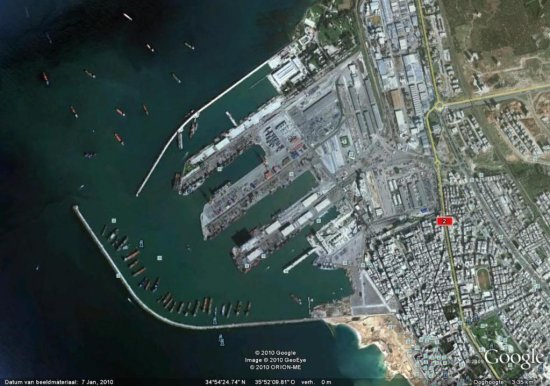

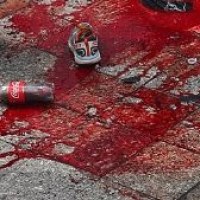
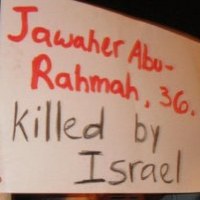

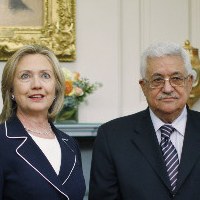
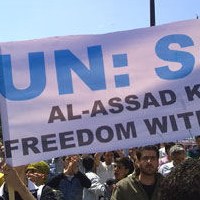




#WikiLeaks : #Syrië Verdacht #Israël Van Moordaanslag | #Cablegate http://j.mp/hAiKAm
#WikiLeaks : #Syrië Verdacht #Israël Van Moordaanslag | #Cablegate http://j.mp/hAiKAm
RT @CrethiPlethi: #WikiLeaks : #Syrië Verdacht #Israël Van Moordaanslag | #Cablegate http://j.mp/hAiKAm